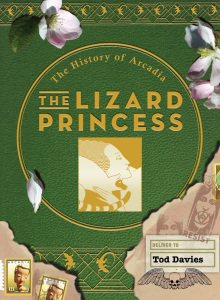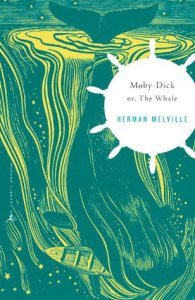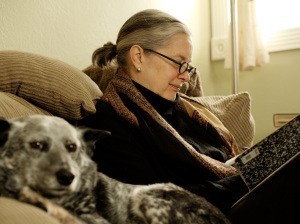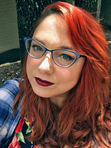Banned Books Month: Guest Post from Tod Davies: The Importance of Story
A story is more than just a tale told to pass the time, an entertainment frivolously cavorting on the sidelines of real life. For Story is Real Life itself, literally. Stories are the atomic particles of the world as we perceive it, the world that we build ourselves, every moment, in the stories we tell about and to ourselves.
As a wise person once said: “It had to be believed to be seen.”

Exterminating Angel Press, November 2015.
Where do these stories come from, then? The stories that make up, delineate, define our world? From a huge, perhaps infinite, storehouse, deep below our collective surface life: a vast sea of the unconscious.
In Herman Melville’s MOBY DICK, a little cabin boy falls overboard while the Pequod crew is in pursuit of the whale. They have no time to stop for him, but return the next day to find him floating in the midst of an endless sea. And he has gone completely mad.
Melville clearly means the poor boy has fallen into that eternity of possible stories, into a vastness he can’t comprehend, let alone make any sense of, far from any small story that will establish him as a subject in the midst of endlessness, while the world he knows fights to subdue a huge symbol rising up from that very deep. That fear is in all of us, I think, and rightly so. Lurking behind each painfully built up individual personality is an eternity of unconsciousness. Of symbols still unknown, still waiting—sometimes not so patiently—to be brought to the surface and revealed. Of desires, and instincts, and passions we have yet to let into our selves, and through our selves, into our cultural discourse.
Of fearsome symbols we attempt to capture and kill, through our fear, and the rage that comes from feeling that fear.
For what draws these stories up from the deep are feelings. Strong feelings of whatever kind: Desire. Wonder. Anger. Fear.
We’re right to be afraid. We are, as individual people, so much smaller than the enormous field from which we and our stories spring, where so many (it may be an infinite amount) of contents yet unimagined, let alone expressed, lie, waiting to be born.
And I think that is what fuels the banning of books: the fear of our own smallness in the face of the literally unimaginable hugeness from which we come.

Modern Library Edition, October 2000.
I ponder now why books are so quickly rejected and banned—even MOBY DICK, banned in the 1990s by a Texas school board for being “against community values.” Most of all, I ponder the almost hysterical tone of the bannings, both those from what we call the ‘right wing’ as well as those from the ‘politically correct’. In both cases, it’s as if these interdictions defend against an enormous, unfathomable space that threatens to engulf us, that must be fought off at all costs…even at the cost of reasoned debate.
Maybe especially at the cost of reasoned debate. And this, more than anything else, proves what depths of feeling rise up in response to these books, what enormous fears fuel what enormous, at times uncontrollable, rage.
I talked this over with a fellow writer who idly remarked, “I wonder why school districts continue to give books free publicity by banning them.” Then ruefully, “I just wish someone would ban one of mine!” Of course that little joke points to the heart of the problem. If a book doesn’t arouse strong feeling, it’s not going to be banned. It’s the strong feeling that’s at the center of the mystery. The desire to fend off the strong feeling. The fear that the strong feeling indicates some wider unwelcome truth.
The strong feeling that suggests a different way of looking is knocking impatiently at the door to consciousness, waiting, even demanding, to be let in.
A culture needs gatekeepers, sure. It needs to preserve its integrity lest it disappear entirely into the vastness of an ocean stretching eternally in all directions. Some ideas in their stupid venality are not a good addition to the general conversation. Still they may have to be put up with for the sake of what other treasures can be found nearby.
For there are riches in that deep unexplored realm, for those brave enough, and wise enough, to seek them. New symbols. New ideals. New ways of being that have been kept out of the old story in order to keep that story the way it has always been.
We want to be sure that we’re not fending off exactly the same symbols that might be most valuable to us in the future. That the horrifying mysteries that seem impenetrable to us now may not turn out to be saving truths tomorrow.
We need to trust ourselves a little more, and observe ourselves, too, so that we know a little more clearly why we act as we do. What we don’t want is to pen ourselves into a deceptively safe box with no window looking out onto a larger potential world. Especially not now, at this point in our human history, when the old stories, the old ideas are clearly not working for us as well as they have in the past. Now more than ever we need to have a care: when an idea, any idea, provokes in you a strong feeling of revulsion, ask where that feeling comes from. Make sure it doesn’t come from a fear of opening yourself to a new, larger world, a fear of being swallowed up in a sea of new ideas.
Make sure it isn’t a new Story that frightens you into a rage to destroy it before you understand its true nature. For the Great White Whale that Ahab chases may mean something far different than the destructive force of an evil nature it is to the men on the Pequod. It may even provide some saving truths that people on land desperately need.
It’s a big responsibility, the making of, and the responding to, Story. For it’s the interplay between Story and Feeling that forms the Self. And through the Self, the World—our World—at large.

Tod Davies.
Tod Davies, editor of indie Exterminating Angel Press, is the author of The History of Arcadia series: SNOTTY SAVES THE DAY, LILY THE SILENT, and the soon-to-be-released THE LIZARD PRINCESS (November 2015), as well as her cookbook/memoirs in the Jam Today series. Unsurprisingly, her attitude toward publishing is the same as her attitude toward literature, cooking, and, come to think of it, life in general: it’s all about working with the best of what you have to find new ways of looking and new ways of being, and, in doing so, to rediscover the best of our truly human values. Davies lives with her husband, filmmaker Alex Cox, and their two dogs, in the alpine valley of Colestin, Oregon.








